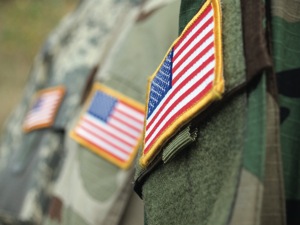
In an ideal world the repeal of DADT would have been enough to right the societal wrongs that had forced gays and lesbians in the military to live clandestine lives, lying about their sexuality for fear of being drummed out of the service if their true feelings were ever revealed; but that wasn’t the case for a Marine serving in Afghanistan we’ll call “Steve Jones.”
Most believe the end of DADT should have given rise to an era of freedom from fear for gay servicemen and servicewomen, but instead, for at least one, it has become the catalyst for an even more hostile environment in at least one unit. According to Steve Jones, his is a group of leathernecks among whom being openly gay means enduring barely disguised threats and large helpings of intimidation.
But the story does not start with the Camp Pendleton-based Marine’s Afghan deployment. Instead, it begins many months earlier when Marine Jones met his boyfriend. Subsequently, upon news of the impending deployment there followed a flurry of “next of kin” official paperwork where Marines were required to confirm who should get their pay and possessions should the unthinkable become an all too common reality of the last 10 years of war.
One day following the repeal of DADT, Marine Jones was called in to what he was assured was a closed-door, private meeting only to learn it had been called to find out why he had put his boyfriend’s name down on the next of kin form instead of his parents. The next day his entire unit knew he was gay, his boyfriend’s name and that the boyfriend had been named as the recipient of any money due him by the military.
What followed was a time of barely disguised death threats – talk of throat-cutting in Afghanistan loud enough for him to hear as he walked past – and unsubtle intimidation with talk of him not to expect any help if anything happened in Afghanistan.
Says Jones, “I have received threats in my company and my main concern is being cast away and betrayed. I plan on coming home, but I fear that something might happen to me that has nothing to do with combat.”
And of the threats he says, “To be honest, the threats were not direct. Everything I heard was when I was passing by. The reason why I didn’t look back was because I was afraid they might catch me seeing them as they spoke about me. Probably one of the reasons I didn’t want to report (the incidents) was because I didn’t want to deal with the backlash. The threats consisted of them saying I was going to wake up with my throat sliced. Other comments were like, ‘He is such a faggot,’ and ‘He is freaking disgusting,’ and again I did not want to look back because I was afraid.”
One of Jones’ partner’s main concerns is, “Fellow Marines not helping him if something happens.”
The legacy of DADT is an ingrained hostility to gays and a lifestyle that for years was either illegal in the military or something not to be acknowledged or talked about. That is a mentality that for some could take a long time to change, if it changes at all.

Says Jones, “There are some that are a little understanding but the majority of them kind of stare at me as if I was doing something wrong.”
Prior to and after DADT, the climate of hostility toward gays from within the military, not just the U.S. Marine Corps and Camp Pendleton, has been well documented.
This climate of hostility and non-support goes beyond deployed units and stretches to the gay partners left behind. Before DADT was repealed there was virtually no support within the military for gay partners left behind when a serviceman or servicewoman was posted overseas. For the military to acknowledge that a gay partner needed emotional or physical support would inevitably lead to the conclusion that their military partner posted overseas was gay, which would have led to dismissal.
Post-DADT, is there now any official support network for gay partners? Jones’ partner doesn’t think so, saying, “(There is) nothing belonging to the military, but there is servicemembers.org, militarypartners.org and the SU Facebook page. Those sites are very helpful but not provided by the military.”
Is the same military support network that is available to non-gay couples available to gay couples? Again Jones’ partner doesn’t think so, “No,” he says. “But there are many on-base military support groups and even services to (non-gay) partners and family members of deployed servicemembers.”
Tragically, and recently, there has been a very public example of a hostile environment with the unresolved murder of a gay man at Camp Pendleton. June 29, 2009, Seaman August Provost, while stationed with Amphibious Assault Unit 5 of Camp Pendleton, was found shot three times, his hands bound behind him and his body burned. Initially, the Navy did a very poor job of covering up the nature of the crime, claiming he was shot while on guard duty at a main entrance gate post. The serviceman accused of his murder conveniently committed suicide while in custody preventing the potentially awkward situation of the military having to deal with a very visible hate crime admission on their watch. The murder, and motive, has never been officially solved.
There are also multiple precedents for sometimes tragic anti-gay climates at military bases nationwide, no more so than the one at Fort Campbell in 1999 that led to the murder of infantryman Barry Winchell, who was dating an LGBT transgender showgirl. The hostile climate at the base, and the lack of effort by the commanding authority to change it, was seen by many as a contributing factor to the murder, which was committed by a fellow soldier, and followed ongoing harassment of Winchell for his perceived sexual orientation.
For Jones, who brought the intimidation up with his sergeant, efforts to deal with the problem apparently stayed within his immediate unit. Whether the problem was raised higher up the chain of command remains to be seen.
Says Jones’ boyfriend, “I don’t feel anything has changed (since the repeal). There is no protection from the higher ups if there is homophobia and threats within your command.”

For some though, there is an unfailing faith that all will be right again once any intimidation has been brought to the attention of the lower echelons of military authority and the chain of command. The question for many though is how much faith do you put in a military system that has systematically failed to find the answers in the past, with often tragic results?
Even some Marines don’t seem to have much faith. Jones has spoken to another Marine in Afghanistan who is too scared to come out because of the threatening environment.
A major question then is whether Jones’ incidences of intimidation are an isolated case or part of something more sinister, and perhaps an underlying problem.
Jonathan Hopkins, Washington D.C. director of Outserve, says that, “Implementation has been quite professional. There have been no reported incidents like violence or harassment. There have been a few instances where people have had to work things out with their command. But in all those situations the system worked and they reported the issues and they have been reconciled and resolved.”
Says Zeke Stokes, communications director of Servicemembers Legal Defense Network (SLDN), “We’ve heard no reports of incidents of this nature, first hand or otherwise. All feedback from the field has been positive and that, as expected, repeal implementation is occurring smoothly.”
But some observers note that, with what was quite obviously a hostile environment for gays in the military before the repeal of DADT, does it make sense that everything should change so dramatically overnight? The president signing a piece of paper does not change the attitudes people have held for years.
And yet Stokes is confident, saying, “The Pentagon undertook comprehensive training for servicemembers in all branches, outlining repeal implementation, answering their questions, and addressing their concerns. We believe this training was very effective.”
Still, some observers feel there is almost a desperate sense that the repeal of DADT goes as seamlessly as possible, and that those involved in the integration process are only interested in the positive outcomes of the repeal.
Yet anyone reading the blogs and message boards associated with gays in the military and media coverage since the DADT repeal can’t help but notice that extremely hostile attitudes toward the subject more than just still exist, they seem to be almost flourishing.

But says Stokes, “Blogs and message boards are not necessarily reflective of what’s actually happening on the ground.”
And yet equally, argue some, the reverse could just as easily be true. While those in authority, military or otherwise, have their vision tainted by the need for a positive spin on the repeal, the reality on the ground, as evident in the case of Jones and even the hostile message boards, is that discrimination and threats have far from ended.
Others note that, in Jones’ case, with so much hostility toward one Marine existing within a single unit, and from multiple sources, the question must be how much hostility still exists throughout the Marines and the military that is going unreported? And how much of it is now going further underground until the hue and cry of the repeal subsides?
Even more troubling, could there now be an even unhealthier environment in some military units than before, where gays are now even more reluctant to report intimidation for fear of disrupting the hoped-for smooth transition to gay military acceptance? Out of the frying pan, and into the fire?
Perhaps only time will tell. In the meantime, for servicemen like Jones, discrimination and barely disguised threats are an only too real part of their day-to-day lives.











I know this website presents quality dependent articles and extra information, is there
any other website which offers these data in quality?
Hi friends, its great piece of writing concerning teachingand
entirely explained, keep it up all the time.
Admiring the commitment you put into your website and in depth
information you provide. It’s nice to come across a blog every once in a while
that isn’t the same outdated rehashed material.
Great read! I’ve saved your site and I’m including your RSS feeds to my Google account.